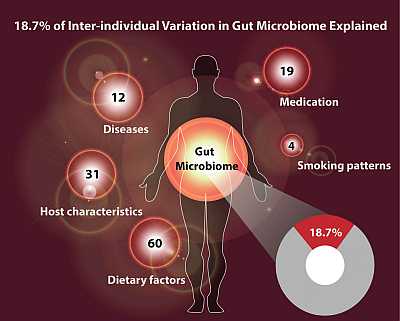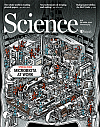
Lifestyle impact on intestinal bacteria

NEWS 1st June: This paper was awarded the TIFN (Top Institute Food and Nutrition) Publication prize at their 2016 conference.
Everything you eat or drink affects your intestinal bacteria, and is likely to have an impact on your health. That is the finding of a large-scale study led by RUG/UMCG geneticist Cisca Wijmenga into the effect of food and medicine on the bacterial diversity in the human gut, which is published this Friday in the prestigious research journal Science.
In this study researchers collected stool samples from more than 1100 people taking part in the LifeLines programme, which is monitoring the health of 165,000 residents of the Northern Netherlands. The samples were used to analyse the DNA of the bacteria and other organisms that live in the gut. In addition to stools, the study collected information on the participants’ diet, medicine-use and health.
This study is unique in that it is focussed on a group of normal people whereas previous research was frequently focussed on patients with a specific illness. Further, the study covered an exceptionally large group of people and studied their gut DNA in detail. “Normally researchers only investigate one particular region of DNA in which different groups of bacteria can be distinguished,” Wijmenga explains. “We have mapped all the DNA to gain much more detailed information about bacteria types.”
This DNA analysis made it possible to examine which factors impact the diversity of the microbiome (the intestinal bacterial community unique to each of us). And that appears to be many. Wijmenga says, “You see, for example, the effect of diet the gut.” People who regularly consume have a greater diversity of gut bacteria. Coffee and wine can increase the diversity as well, while or a high-calorie diet can decrease it.
“In total we found 60 dietary factors that influence the diversity. What these mean exactly is still hard to say,” explains UMCG researcher Alexandra Zhernakova, the first author of the Science article. “But there is a good correlation between diversity and health: greater diversity is better.”
Beyond diet, at least 19 different kinds of medicine – some of which are widely used –have an impact on microbiome diversity. An earlier study by Groningen researchers has shown that antacids decrease this diversity, while antibiotics and the diabetes drug metformin also have an effect. These are important findings Wijmenga stresses, “Disease often occurs as the result of many factors. Most of these factors, like your genes or your age, are not things you can change. But you can change the diversity of your microbiome through adapting your diet or medication. When we understand how this works, it will open up new possibilities.”
Recent research has demonstrated the importance of the microbiome as a therapy target. It is now possible to combat obesity through a ‘faecal transplantation’ in which the intestinal bacteria from a slender person are introduced into the gut of an obese patient. An appropriate diet or a specific medicine may produce the same effect on the microbiome.
Currently a lot of research is looking into the microbiome, but it often seems hard to reproduce. It is therefore striking that the results of a Belgian group published in the same issue of Science show about 80 percent agreement with those of the Groningen group. “The key is the way the research was done,” Wijmenga says. What was important was that the stool samples were frozen immediately by the participants, and picked up by the researchers while still frozen. “When samples are sent in by post, as is often the case, they are exposed to oxygen and high temperatures. These are conditions that some bacteria can’t survive in. These two Science studies have therefore set a new standard for future research in this field.”
The paper has gained massive press and media coverage (see links below).
References (Science, April 29, 2016)
Population-based metagenomics analysis reveals markers for gut microbiome composition and diversity
Alexandra Zhernakova, Alexander Kurilshikov, Marc Jan Bonder, Ettje F. Tigchelaar, Melanie Schirmer, Tommi Vatanen, Zlatan Mujagic, Arnau Vich Vila, Gwen Falony, Sara Vieira-Silva, Jun Wang, Floris Imhann, Eelke Brandsma, Soesma A. Jankipersadsing, Marie Joossens, Maria Carmen Cenit, Patrick Deelen, Morris A. Swertz, LifeLines cohort study, Rinse K. Weersma, Edith J. M. Feskens, Mihai G. Netea, Dirk Gevers, Daisy Jonkers, Lude Franke, Yurii S. Aulchenko, Curtis Huttenhower, Jeroen Raes, Marten H. Hofker, Ramnik J. Xavier, Cisca Wijmenga, Jingyuan Fu
http://science.sciencemag.org/content/352/6285/565
Population-level analysis of gut microbiome variation
G. Falony, M. Joossens, S. Vieira-Silva, J. Wang, Y. Darzi, K. Faust, A. Kurilshikov, M.J. Bonder, M. Valles-Colomer, D. Vandeputte, R.Y. Tito, S. Chaffron, L. Rymenans, C. Verspecht, L. De Sutter, G. Lima-Mendez, K. D’hoe, K. Jonckheere, D. Homola, R. Garcia, E.F. Tigchelaar, L. Eeckhaudt, J. Fu, L. Henckaerts, A. Zhernakova, C. Wijmenga, J. Raes
http://science.sciencemag.org/content/352/6285/560

Links to media coverage
Introduction to Science Special Issue on Microbiota Manipulating the Microbiota
Comment in Science https://www.sciencemag.org/news/2016/04/your-gut-bacteria-are-more-what-you-eat
Perspective in Science on Antibiotic use and its consequences for the normal microbiome
Scientific American: http://www.scientificamerican.com/article/findings-from-the-gut-new-insights-into-the-human-microbiome1/
Time: http://time.com/4312478/wine-coffee-microbiome-health-study/
US News and World Report: http://www.usnews.com/news/articles/2016-04-29/red-wine-is-good-for-gut-health-new-research-suggests
Washington Post https://www.washingtonpost.com/news/speaking-of-science/wp/2016/04/29/why-drinking-red-wine-and-eating-chocolate-may-be-good-for-your-gut/ while The Independent (UK) reprinted this article
The Atlantic by Ed Yong: http://www.theatlantic.com/science/archive/2016/04/why-are-your-gut-microbes-different-from-mine/480207/
The Boston Globe
Wine Spectator: https://www.winespectator.com/magazine/show/id/53264
Food and Wine: http://www.foodandwine.com/blogs/two-liquids-are-surprisingly-good-gut-bacteria
Health: http://news.health.com/2016/04/29/coffee-wine-good-for-healthy-gut-sodas-may-be-bad/
Shape: http://www.shape.com/healthy-eating/healthy-drinks/wine-yogurt-contributes-healthy-gut
Elle Australia: http://www.elle.com.au/beauty/health-fitness/2016/5/why-wine-is-good-for-your-gut/
GenomeWeb: https://www.genomeweb.com/sequencing-technology/gut-microbiome-makeup-influenced-medication-use-other-factors
TheStar.com, Toronto http://www.thestar.com/news/world/2016/04/28/studies-aim-to-map-huge-world-of-the-human-gut.html
Cover in other languages
Eurekalert on the Belgian study http://www.eurekalert.org/pub_releases/2016-04/vfi-wfm042516.php
NOS Journaal 28 april 2016, interview met Cisca Wijmenga, http://nos.nl/uitzending/14922-nos-journaal.html (op 9.50 min) and http://nos.nl/artikel/2102018-rode-wijn-en-karnemelk-zijn-goed-voor-onze-darmflora.html . (Was also on Nieuwsuur and late-night journaal 28 April; Radio 1 and RTV noord radio, 29 April)
Artikelen in Nederlands kranten 29 april 2016 ( NRC, NRC next, Dagblad van het Noorden, Nederlands Dagblad
Volkskrant 1 mei). It was trending topic no. 2 on the NRC website on 29-04
De Kennis Van Nu. Darmflora binnenstebuiten gekeerd door Herman Visser, 28-04
Medisch Contact, 2 mei 2016. Invloeden op variëteit darmflora in kaart. Henk Maassen
Press release from Novosibirsk University: http://nsu.ru/a9dd7be27b8352ae290285bc73c7c346
Follow-up report in Russian: http://ria.ru/science/20160429/1422928283.html
Two reports in Spanish: interviews with Maria Carmen Cenit and Sasha Zhernakova:
http://www.lavanguardia.com/ciencia/20160428/401433349191/dieta-cafe-chocolate-microbiota-intestinal.html
http://www.elmundo.es/salud/2016/04/28/5722532f46163f844b8b45b8.html
On Mexican news: http://www.zocalo.com.mx/seccion/articulo/vino-y-cafe-pueden-mejorar-la-salud-1462128188
Vietnamese news, EVA: http://eva.vn/suc-khoe/an-va-uong-thuoc-dung-cach-c131a265798.html
Web news coverage
CBS News: http://www.cbsnews.com/news/coffee-wine-good-for-the-gut-but-what-about-soda/
Ars Technica: http://arstechnica.co.uk/science/2016/04/drugs-wine-mushy-poops-explain-gut-microbe-variation-but-just-a-little/
Science World Report: http://www.scienceworldreport.com/articles/39117/20160503/drinking-wine-coffee-good-gut.htm
Popsugar: https://www.popsugar.com/fitness/Health-Benefits-Coffee-Wine-41160966
Endocrinology advisor: http://www.endocrinologyadvisor.com/general-endocrinology/diet-can-affect-microbial-diversity-in-gut/article/493173/
Counsel & Heal: http://www.counselheal.com/articles/23685/20160502/drink-coffee-wine-for-a-good-gut.htm
University Herald: http://www.universityherald.com/articles/29607/20160502/new-studies-show-why-red-wine-dark-chocolate-good-gut.html
Healthnewsline: http://www.healthnewsline.net/drinking-tea-coffee-red-wine-actually-good-gut-bugs-study-finds/2535282/
Modern readers: http://www.modernreaders.com/study-tea-coffee-wine-linked-improved-gut-health/45195/ed-jones
Perf Science: http://perfscience.com/content/2143808-two-studies-present-most-comprehensive-work-human-microbiome-till-date
RT new service: https://www.rt.com/news/341455-wine-coffee-gut-study/
Science News Hub: http://www.newslodi.com/life-science/301908-the-effects-of-sugary-drinks-or-coffee-on-body-microbes
Medical Daily: http://www.medicaldaily.com/microbiome-gut-bacteria-wine-coffee-384151
Headlines and Global News: http://www.hngn.com/articles/198446/20160429/wine-coffee-help-microbiome-gut-bacteria-diversity-increases.htm
Big Think: http://bigthink.com/paul-ratner/drinking-wine-and-coffee-is-good-for-your-gut
Nature World News: http://www.natureworldnews.com/articles/21562/20160503/wine-coffee-lovers-unite-study-shows-red-wine-dark-chocolate-good-for-your-gut.htm
This project was funded by grants from the Top Institute Food and Nutrition, the Netherlands Organization for Scientific Research (NWO), CardioVascular Research Nederland, and the European Research Council, as well as institutional funding to individual authors.
Contact: Prof. Cisca Wijmenga
More news
-
15 September 2025
Successful visit to the UG by Rector of Institut Teknologi Bandung
